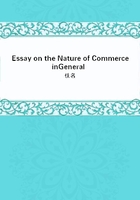
第59章
Of the augmentation and diminution of coin in denomination According to the principles we have established the quantity of money circulating in exchange fixes and determines the price of everything in a State taking into account the rapidity or sluggishness of circulation.
We often see however in the increases and decreases practised in France such strange variations that it might be supposed that market prices correspond rather to the nominal value of coin than to its quantity in exchange, the quantity of livres tournois in money of account rather than the quantity of marks and ounces, which seems directly opposed to our principles.
Suppose, as happened in 1714, ecu is current for 5 livres and the King Arret which orders the lowering of the ecu for 20 months, viz 1 per cent per month to nominal value to 4 livres instead of 5. Let us see will be naturally the consequences of this having regard to the spirit of the Nation.
All those who owe money will make haste to pay it during the diminutions so as not to lose by them. Undertakers and Merchants find it easy to borrow which decides the least able and the least increase their enterprise. They borrow money, as fancy, without interest and load themselves with violence of their demands.
Vendors have getting rid of their merchandise for money which diminish in their hands in nominal value. They towards foreign merchandise and import considerable quantities of it for the consumption of several years. All this causes money to circulate more rapidly and raises the price of everything. Then high prices prevent the foreigner from taking merchandise from France as usual. France keeps her own merchandise and at the same time imports great quantities. This double operation is the reason why considerable amounts of specie must be sent abroad to pay the balance.
The rate of exchange never fails to show this disadvantage.
Exchange is commonly seen at 6 and 10 per cent against France during these diminutions. Enlightened people in France hoard their money in these times. The King finds means to borrow much money on which he willingly loses the diminution, proposing to compensate himself by an augmentation at the end of the diminution.
With this object after several diminutions they begin to hoard money in the King's Treasury, to postpone the payments, pensions, and army pay. In these circumstances money becomes extremely rare at the end of the diminutions both by reason of the sums hoarded by the King and various individuals and by reason of the nominal value of the coin, which value is diminished. The amounts sent abroad also contribute greatly to the scarcity of money, and this scarcity gradually brings it about that the merchandise with which the undertakers are loaded up is offered at 50 or 60 per cent below the prices prevailing at the time of the first diminutions. Circulation falls into convulsions. Hardly enough money can be found to send to market.
Many Undertakers and Merchants go bankrupt and their merchandise is sold at bargain prices.
Then the King augments anew the coinage, settles the new ecu or ounce of silver of the new issue at 5 livres, begins with this new coinage to pay the troops and the pensions. The old coinage is demonetised and received at the Mint at a lower nominal value.
The King profits by the difference.
But all the sums of new coinage which come from the Mint do not restore the abundance of money in circulation. The amounts kept hoarded by individuals and those sent abroad greatly exceed the nominal increase on the coinage which comes from the Mint.
The cheapness of merchandise in France begins to draw thither the money of the foreigner, who finding it 50 or 60 or more per cent cheaper sends gold and silver metal to France to buy it. In this way the foreigner who sends his bullion to the Mint recoups himself easily from the tax paid there on this bullion. He finds the double advantage of the low price of the merchandise he buys, and the loss of the Mint charge falls really on the French in the sale of their merchandise to the foreigner. They have merchandise enough for several years' consumption. They resell to the Dutch, for example, the spices which they bought of them for two thirds of what they paid. All this takes place gradually, the foreigner decides to buy these merchandises from France only because of their cheapness. The balance of trade, which was against France at the time of the diminutions turns in her favour at the time of augmentation, and the King is able to profit by 20 per cent or more on all the bullion brought into France and taken to the Mint. As Foreigners now owe a trade balance to France and have not in their country coins of the new issue they must take their bullion and coins of the old issue to the Mint to obtain new coins for payment. But this trade balance which Foreigners owe to France arises only from the merchandise which they import from it at low prices.